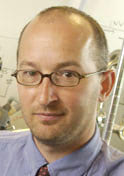- Undergraduate
Bachelor's Degrees
Bachelor of ArtsBachelor of EngineeringDual-Degree ProgramUndergraduate AdmissionsUndergraduate Experience
- Graduate
Graduate Experience
- Research
- Entrepreneurship
- Community
- About
-
Search
All Thayer News
Dartmouth Engineering Professors Secure $7 Million
Mar 04, 2011
CONTACT: Catharine Lamm
603/646-3943
Dartmouth engineering professors Charles Hutchinson and Tillman Gerngross recently secured $7 million in venture capital funding from Boston's Schroder Venture Life Sciences for their Hanover, N.H.-based biotech start-up, GlycoFi, Inc.

Professor Charles Hutchinson
Professor Tillman Gerngross
Hutchinson and Gerngross, CEO/president and CSO of GlycoFi, respectively, founded the 10-person protein manufacturing company which has been incubating in Gerngross's lab at Dartmouth for the past two years. Dartmouth now holds an equity stake in the firm, which will continue to use some of the lab facilities at Dartmouth, while it transitions to a new 13,000 sq ft laboratory facility at Centerra Park.
GlycoFi selected Schroder because of its previous experience in the biotech industry. Mike Ross, a general partner in Schroder's San Mateo, Calif. office and a former biotech entrepreneur, led the funding round along with Terry McGuire, a general partner at Waltham, Mass.-based Polaris Venture Partners, who led the first round of funding in 2000 and was instrumental in the founding of GlycoFi.
Both Ross and McGuire are Dartmouth graduates and maintain close ties to the school as members of the board of overseers at Dartmouth's Thayer School of Engineering.
Additional investors in Glycofi include Boston Millennia Partners and Hanover's Borealis Ventures.
GlycoFi is advancing technological solutions for the safe, fast, and cost-effective mass-production of fully-humanized proteins used in drug discovery and development. Current production of such therapeutic proteins is being pushed beyond capacity by exponential growth in the biopharmaceutical industry. GlycoFi plans to alleviate this manufacturing bottleneck by engineering fungal expression systems that produce therapeutic proteins with human-like structures.
Protein-based biological drugs must be manufactured by living cells which are genetically engineered to produce (or express) the protein of interest. GlycoFi's technology harnesses the inherent advantages of fungal-based protein expression systems that do not promote human pathogens, do not rely on any animal-derived growth factors or media components which could harbor infectious agents, and are able to produce properly folded proteins at an industrial scale.
Some human proteins naturally lack glycosylation (attachment of specific complex carbohydrate structures to the protein) and can therefore be produced by a simple bacterial host. However, over 70% of all human proteins are glycosylated and their successful production as therapeutic agents relies on host systems that can mimic the structures synthesized by humans. By engineering these fungal-based systems to perform human-like glycosylation, this approach allows for the mass-production of fully-humanized therapeutic proteins with optimal pharmacological efficacy.
Currently there are over 80 approved therapeutic proteins in the market, generating in excess of $17 billion in annual sales. With all 30,000 genes of the human genome identified, the biotech industry anticipates explosive growth of new protein-based therapeutics in the upcoming decade. Industry analysts have estimated a total market size for therapeutic proteins in the $100 billion range by 2010.
Three converging trends in particular are contributing to an increased need for safer and more efficient production methods for protein-based therapeutics:
- Genomics and new antibody technologies fueling the discovery pipeline;
- Inefficiency of current manufacturing technologies;
- Evolution of a generic biotech industry.
# # #
Founded in the spring of 2000, GlycoFi has built a research team with extensive cellular engineering, protein production, and protein biochemistry backgrounds and a world class slate of scientific and business advisors. The technology is covered by a patent portfolio with multiple patent applications filed and several in-licensing arrangements for complementary intellectual property completed or under negotiation. The company is lead by a management team with extensive start-up and biotech experience.
For contacts and other media information visit our Media Resources page.
